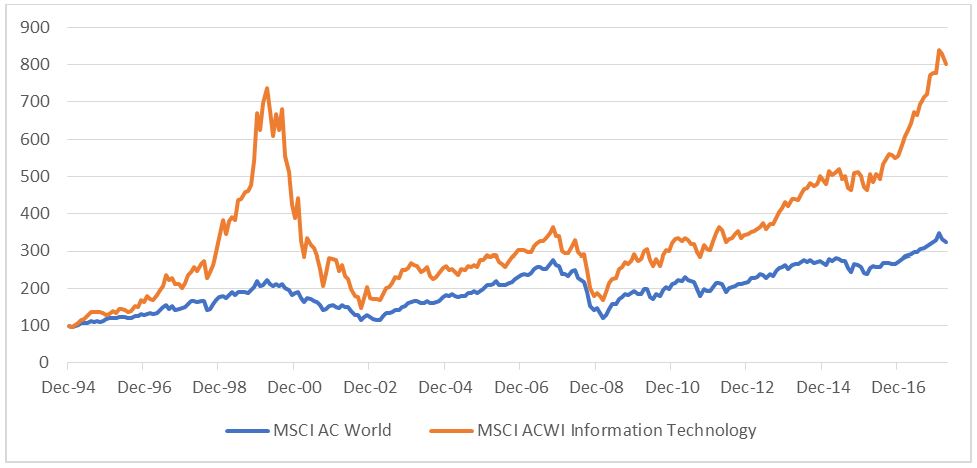PARTNER INSIGHT: Fidelity Global Special Situations Fund manager Jeremy Podger looks at the impact of technology stocks on global equities in recent times. He explains why it's not necessarily straightforward to assess if the sector is overvalued and looks at whether the current market leaders can continue to justify their value.
Key points
- The technology sector had a strong year in 2017 and investors have begun to question whether the stellar performance means stocks are now overvalued.
- The biggest concentration of value in the sector is regarded as being with the ‘FANGs' in the US and the ‘BATs' in Asia.
- Investors should be cautious paying for high growth stocks that typically see a sharp de-rating in value when their growth begins to slow.
With last year's amazing performance of technology stocks, people have rightly asked whether this is an overvalued area. Here the answer is not straightforward. Technology cannot be narrowly defined, and now permeates every industrial sector to a greater or lesser extent. It is rare to see a single sector stand out to the extent that technology did last year. However, aggregate technology profits were also much stronger than for the market as a whole.
Thus the sector's relative valuation based on forward earnings estimates barely shifted. If we want to ask whether this is an overvalued area, we need to find other angles to look at because - in sharp contrast to the state of affairs in the tech bubble of 1999/2000 - earnings-based valuations are not polarised compared to other sectors.
One of the key problems within technology is the concentration of market value in the biggest beasts within the sector (Facebook; Amazon; Netflix and Google (FANGs) and Baidu, Alibaba and Tencent (BAT). These companies all saw strong earnings growth and share price rises last year and thereby became far more significant weights within broad market indices. For these stocks it is probably best to test reasonableness on a case by case basis.
MSCI AC World vs MSCI ACWI Information Technology
 Source: Fidelity International, Thomson Reuters Datastream, 31 March 2018. Indices rebased to 100 as at 1 January 1995.
Source: Fidelity International, Thomson Reuters Datastream, 31 March 2018. Indices rebased to 100 as at 1 January 1995.| Past performance (%) | March 13/14 | March 14/15 | March 15/16 | March 16/17 | March 17/18 |
|---|---|---|---|---|---|
| MSCI AC World | 6.2% | 18.4% | -1.2% | 32.3% | 2.4% |
| MSCI ACWI Information Technology | 12.8% | 30.2% | 5.3% | 43.6% | 15.4% |
Source: MSCI as at 31 March 2018.
Past performance is not a reliable indicator of future returns.
For example, the market value of Alphabet (Google) and Facebook, both of which derive their revenue from and dominate digital advertising, is around US$1,200bn - which compares to an estimated total global advertising spend of around US$500bn. Amazon has a market value of around US$700bn. Walmart has far bigger sales and historically better margins but you pay around US$3.9 for a dollar of sales at Amazon and a little over 50 cents at Walmart.
We know it is fair to pay for growth - but we have to keep asking how much is fair to pay for it - can these companies justify their value in terms of the profits they will eventually earn when they are fully mature? It is worth observing that high growth companies often see sharp de-rating in their shares when their growth rate slows, even if they are still growing faster than the broad average.
Read part one in our market leadership series here.
Important information
The value of investments and the income from them can go down as well as up, so you may not get back what you invest. Past performance is not a reliable indicator of future returns. Investors should note that the views expressed may no longer be current and may have already been acted upon. The Fidelity Global Special Situations Fund uses financial derivative instruments for investment purposes, which may expose it to a higher degree of risk and can cause investments to experience larger than average price fluctuations. Changes in currency exchange rates may affect the value of an investment in overseas markets. Investments in small and emerging markets can also be more volatile than other more developed markets. Reference in this document to specific securities should not be interpreted as a recommendation to buy or sell these securities, but is included for the purposes of illustration only.
Related funds
Fidelity Global Special Situations Fund
FID FIF - Fidelity Global Special Situations Fund W-ACC-GBP
Further Information
Jeremy Podger joined Fidelity in February 2012 and manages the Fidelity Global Special Situations Fund and the Fidelity World Fund (SICAV). He is an experienced investor and has been managing global equities mandates for more than 20 years. Prior to Fidelity, Jeremy was Head of Global Equities at Threadneedle, a fund manager at Investec for seven years and a global and pan-European fund manager for Saudi International Bank. Jeremy has a degree from Cambridge University and an MBA from London Business School.












